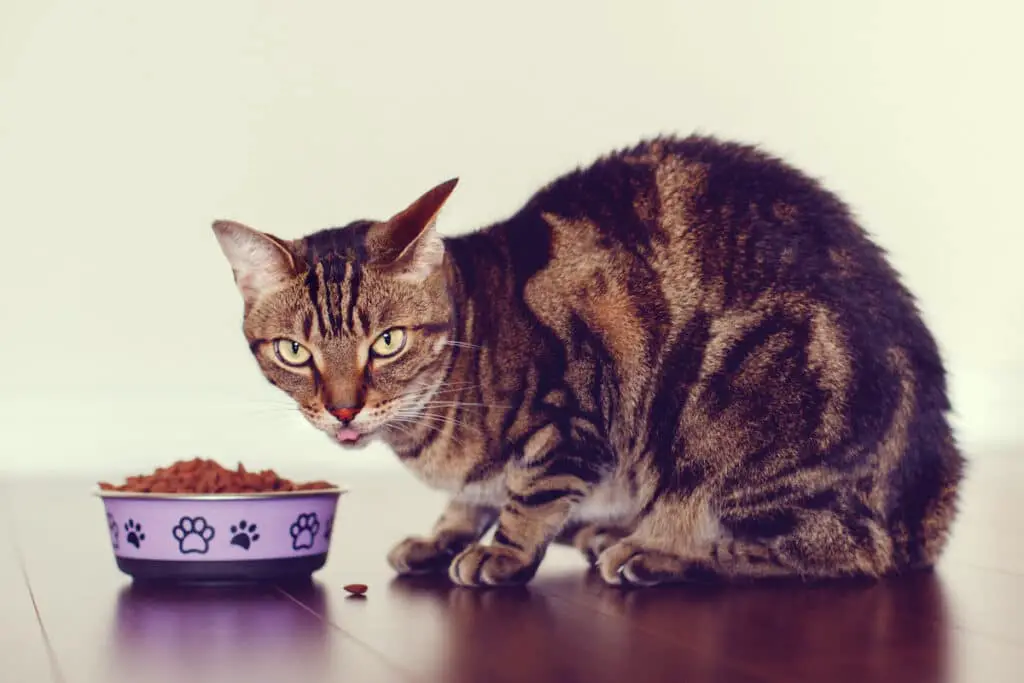Whether you are looking for a veterinary hospital or an alternative vet, there are many reasons your cat may be eating but not losing weight. You will want to know about Hyperthyroidism, Inflammatory bowel disease, food allergies and cancer. Having a vet examine your cat can help you find the right treatment or preventive measures for these illnesses.
Changes in routine
Changing the way that you feed your cat may help her lose weight. However, weight is just one of many factors that are at play. Your cat may be losing weight because she is not eating enough, or she may be losing weight because of some other underlying health problem.
The best way to start is to measure out your cat’s day’s ration at the start of the morning. That way, you don’t have to worry about having to provide extra food later on.
If you have a finicky eater, it may take a couple of weeks for them to get used to the new food. However, if you have several people in your household, it is easier to avoid being tricked into giving your cat extra food.
Dental disease
Having good dental health is an important part of your cat’s health. It can improve your cat’s ability to chew and digest food. It can also reduce the chances of your cat developing infections. It is a good idea to brush your cat’s teeth regularly to reduce the risk of dental disease.
Dental disease is a common medical condition among cats. Dental problems can lead to pain, loss of teeth, and decreased appetite. They can also affect your cat’s grooming habits.
Dental problems are most common in cats that are over two years of age. The signs of dental disease are not always easy to recognize. Some symptoms include loss of appetite, drooling, and bleeding gums.
Inflammatory bowel disease
Typical symptoms of inflammation bowel disease include diarrhea and weight loss. These symptoms may appear as part of other diseases, so it’s important to get a diagnosis from your veterinarian.
Inflammatory bowel disease (IBD) is a chronic inflammatory disease of the gastrointestinal tract. It can affect the small intestine, colon or stomach. Symptoms are usually the result of inflammation that flattens the gut wall and interferes with digestion.
Several types of IBD are recognized: ulcerative colitis, enteritis, gastritis and peptic ulcer. Symptoms vary with the location and severity of the disease.
Inflammatory bowel disease may also be a result of anatomic defects, infections, or dietary intolerances. The goal of treatment is to suppress the immune response and prevent further damage to the digestive tract.
Cancer
Having a cat with cancer is no picnic. Fortunately, there are some things you can do to help. First, you should make sure your cat is eating and getting the nutrients she needs. If she isn’t, she may start losing weight, which is one of the earliest symptoms of cancer.
The aforementioned red flag may be accompanied by other symptoms, such as a sudden change in the number of bowel movements. If you notice your cat is gaining or losing weight, it’s time to visit the vet.
Aside from weight loss, other signs may include vomiting, diarrhoea and a decrease in appetite. While these symptoms are common to many illnesses, they can be especially pronounced in a cat with cancer.
Food allergies
Symptoms of a cat food allergy can be anything from skin irritation to vomiting to diarrhea. The best way to diagnose your cat’s food allergy is through an elimination diet trial. This test involves feeding your cat a new diet for a few months. It is not a replacement for a visit to the veterinarian.
Although it is not uncommon for animals to suffer from food allergies, it is not common. Food allergies are caused by the immune system overreacting to specific ingredients. In the case of a cat food allergy, the source of the allergen is usually a protein source. The most common foods include beef, chicken, and fish.
Hyperthyroidism
During a physical examination, your vet may find your cat to be grumpy and ravenously hungry. This is a sign of hyperthyroidism, a condition where the thyroid gland produces more thyroid hormone than the body needs.
Hyperthyroidism is a common disorder in cats, affecting approximately one in every 10 cats over ten years. Treatment is usually very effective and most cats are cured. However, some cats continue to have problems with their heart and kidneys if not treated.
Hyperthyroidism causes cats to lose weight, drink more water and urinate more frequently. These changes can be subtle at first, but as the disease progresses, the signs become more obvious.














